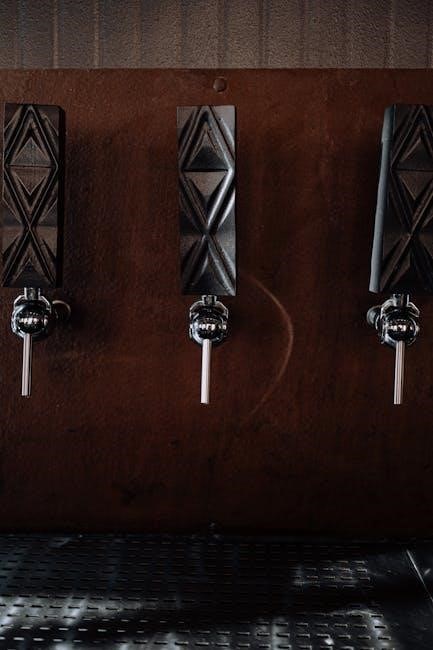The Hospitality Industry Award Pay Guide is a comprehensive resource outlining minimum wages, allowances, and classifications for employees in the hospitality sector, ensuring compliance and fair compensation practices․

Overview of the Hospitality Industry Award
The Hospitality Industry Award provides a framework for fair wages, classifications, and working conditions in the hospitality sector․ It applies to employees in hotels, restaurants, cafes, and related businesses, ensuring compliance with minimum pay rates, penalty rates, and allowances․ The award is regularly updated to reflect industry changes and economic conditions․ Employers and employees rely on this document to understand their rights and obligations, fostering transparency and equity in the workplace․ It covers various roles, from entry-level positions to senior management, ensuring all staff are compensated fairly for their work․ The award is a critical reference for maintaining legal compliance and promoting a balanced workplace environment․
Importance of the Pay Guide for Employers and Employees
The Hospitality Industry Award Pay Guide is crucial for both employers and employees, ensuring compliance with legal wage standards and promoting fair compensation․ For employers, it provides clarity on minimum pay rates, penalty rates, and allowances, helping to avoid underpayment and legal disputes․ Employees benefit from transparent pay scales, ensuring they receive fair wages for their roles․ The guide also outlines working conditions, such as overtime and public holiday rates, fostering trust and accountability between employers and staff․ Regular updates ensure the guide reflects current industry standards, making it an essential tool for maintaining workplace fairness and compliance․ It supports a balanced and productive work environment․

Structure and Classification of Roles in the Hospitality Industry
The Hospitality Industry Award organizes roles into clear classifications, ensuring fair pay and progression․ Employees are categorized into levels based on experience and responsibilities․ Introductory levels apply to new entrants, while higher levels correspond to skilled roles like cooks or front-office staff․ Classifications determine minimum wages, with specific rates for casual, part-time, and full-time positions․ This structure provides clarity for employers when setting pay scales and helps employees understand their entitlements․ By standardizing roles, the award promotes consistency across the industry, ensuring that all workers are fairly compensated based on their role and experience, fostering a transparent and equitable workplace environment․ This system is regularly updated to reflect industry needs․

Key Components of the Hospitality Industry Award Pay Guide
The Hospitality Industry Award Pay Guide outlines minimum wage rates, penalty rates, overtime pay, allowances, and annual wage reviews, ensuring fair compensation across the sector․
Minimum Wage Rates and Classifications
The Hospitality Industry Award Pay Guide establishes minimum wage rates based on employee classifications, ensuring fair pay across different roles․ These rates are updated annually and apply from the first full pay period on or after July 1st each year․ Classifications range from introductory levels to higher-level positions, with specific rates for roles like food and beverage attendants, cooks, and front office staff․ For example, introductory-level employees may earn around $16․69 per hour, while Level 2 roles, such as clerical or front office positions, start at $17․78 per hour․ Higher classifications, including cooks and kitchen staff, may earn up to $32․31 per hour․ These rates are designed to reflect the skills and responsibilities associated with each role, ensuring equitable compensation across the hospitality sector․
Penalty Rates and Overtime Pay
Penalty rates and overtime pay are essential components of the Hospitality Industry Award, ensuring fair compensation for work under specific conditions․ Penalty rates apply to shifts on weekends, public holidays, or late nights, increasing the hourly wage by a percentage․ For example, weekend shifts may attract a 25% increase, while public holidays could see higher penalties․ Overtime pay is required for work exceeding standard hours, typically calculated at 1․5 times the normal rate for the first two hours and double thereafter․ These provisions aim to balance employee workload and compensation, ensuring compliance with fair labor standards in the hospitality sector․
Allowances and Loadings
Allowances and loadings within the Hospitality Industry Award are additional payments to compensate employees for specific work-related expenses or conditions․ Meal allowances, for instance, reimburse employees for meals purchased during work hours, while uniform maintenance allowances cover the cost of cleaning or replacing work attire․ Casual loadings, typically 25% of the base rate, are paid to casual employees in lieu of leave entitlements․ Other special allowances may include first aid, tool, or travel allowances, depending on the role․ These provisions ensure employees are fairly compensated for their unique work circumstances, maintaining equity and adherence to industry standards․
Annual Wage Review and Updates
The Annual Wage Review ensures fair pay adjustments, reflecting economic conditions and cost of living․ Updates to the Hospitality Industry Award occur yearly, typically from July 1, with rates adjusted based on the Fair Work Commission’s decisions․ These changes aim to maintain wage fairness and align with industry needs․ Employers must implement new rates from the first full pay period on or after July 1․ Staying informed about these updates is crucial for compliance and ensuring employees receive correct payments, fostering trust and stability in the workplace․ Regular reviews help the award stay relevant amid evolving industry demands and economic factors․
Classification Levels and Pay Rates
The Hospitality Industry Award categorizes roles into distinct levels, each with specific pay rates, ensuring fair compensation based on job responsibilities and experience, as outlined in the pay guide․
Introductory Level Pay Rates
The introductory level pay rates under the Hospitality Industry Award are designed for new employees entering the sector․ As of July 1, 2025, the introductory rate is set at $16․69 per hour․ This rate applies to employees with limited experience, ensuring a fair starting point for those in the early stages of their hospitality career․ The pay guide specifies that these rates are subject to annual reviews and adjustments, reflecting changes in the industry and economic conditions․ Employers must adhere to these rates to maintain compliance with the award standards, providing a clear and consistent framework for remuneration at this level․
Level 2 Classifications and Corresponding Pay Rates
Level 2 classifications under the Hospitality Industry Award encompass roles requiring basic skills and responsibilities․ As of July 1, 2025, the pay rate for Level 2 positions, such as clerical, front office, and food service roles, is $17․78 per hour․ These rates are established to reflect the specific duties and expectations associated with each role․ The pay guide ensures that employees in these classifications receive fair and consistent compensation, aligning with industry standards․ Employers are required to adhere to these rates to maintain compliance, providing clarity and transparency in remuneration for Level 2 staff across the hospitality sector․
Level 3 Classifications and Corresponding Pay Rates
Level 3 classifications within the Hospitality Industry Award are assigned to roles requiring advanced skills and greater responsibility․ As of July 1, 2025, Level 3 positions, such as senior food and beverage attendants or kitchen supervisors, are entitled to a pay rate of $18․49 per hour․ These rates are designed to recognize the increased complexity and accountability associated with Level 3 roles․ The pay guide ensures that employees in these classifications are appropriately compensated, reflecting their contribution to the industry․ Employers must adhere to these rates to maintain compliance and fairness in workplace remuneration․
Higher-Level Classifications and Their Pay Rates
Higher-level classifications in the Hospitality Industry Award cater to experienced professionals with specialized expertise․ These roles, such as executive chefs or hotel managers, are compensated with premium pay rates reflecting their advanced responsibilities․ As of 2025, these classifications attract rates exceeding $40 per hour, ensuring that high-level contributions are appropriately acknowledged․ The pay guide emphasizes fair compensation for these critical positions, aligning with industry standards and fostering a motivated workforce․ Employers must ensure accurate classification and payment to maintain compliance and retain skilled personnel in a competitive market․ This ensures transparency and equity in remuneration across the hospitality sector․

Penalty Rates and Working Conditions
Penalty rates and working conditions are crucial in the hospitality industry․ They ensure fair compensation for employees working under challenging circumstances, such as weekends, public holidays, or night shifts․
Weekend and Public Holiday Penalty Rates
Weekend and public holiday penalty rates are essential components of the Hospitality Industry Award Pay Guide․ These rates ensure employees receive additional compensation for working on weekends, public holidays, or outside standard hours․ For instance, working on a Saturday may attract a higher rate than a weekday, while Sundays and public holidays often have even greater penalties․ Such provisions aim to reflect the inconvenience and additional demands of working during these periods․ Employers must adhere to these rates to maintain compliance and fairness, ensuring staff are appropriately remunerated for their time and effort during these specified days․
Night Shift and Overtime Penalty Rates
Night shift and overtime penalty rates are critical elements of the Hospitality Industry Award Pay Guide․ These provisions ensure that employees working beyond standard hours receive additional compensation․ Night shifts typically incur a higher rate due to the antisocial nature of the work, often calculated as a percentage increase on the base wage․ Overtime rates apply when employees work extended hours beyond their usual schedule, providing a premium payment to recognize the extra time and effort․ These rates vary depending on the time of day, duration of overtime, and specific circumstances outlined in the award, ensuring fair compensation for employees who work beyond standard hours․
Casual Loadings and Their Implications
Casual loadings are additional payments made to casual employees in the hospitality industry to compensate for the lack of leave entitlements and job security; These loadings are typically calculated as a percentage of the base rate, often ranging between 20-25%, depending on the award provisions․ The Hospitality Industry Award Pay Guide specifies that casual employees must receive these loadings to ensure fair compensation for their employment arrangement․ Employers are required to factor in these loadings when calculating total remuneration, while employees benefit from higher hourly rates to offset the absence of permanent employee benefits․ Compliance with these loadings is essential to maintain fairness and adherence to the award standards․
Allowances and Additional Payments
Allowances and additional payments in the hospitality industry are extra amounts paid to employees to cover work-related expenses, such as meals, uniforms, travel, and other special allowances, as outlined in the pay guide to ensure fair compensation․
Meal Allowances and Uniform Maintenance
Meal allowances and uniform maintenance provisions are outlined in the hospitality industry award pay guide to reimburse employees for work-related expenses․ Employees may receive a meal allowance to cover the cost of meals during work hours or while traveling for work․ Additionally, uniform maintenance allowances are provided to offset the cost of maintaining required work attire, such as cleaning or replacing uniforms․ These allowances are paid in addition to the base wage and are designed to ensure employees are not out of pocket for expenses incurred while performing their job duties․ Such provisions aim to promote fairness and transparency in compensation practices within the hospitality sector․
Travel and Transportation Allowances
Travel and transportation allowances are provided to hospitality employees who incur expenses while traveling for work-related purposes․ These allowances cover costs such as public transport, fuel, or vehicle maintenance when employees are required to travel as part of their job․ The pay guide specifies the rates and conditions under which these allowances are payable, ensuring employees are reimbursed fairly for work-related travel․ Such provisions aim to minimize out-of-pocket expenses and ensure that employees are adequately compensated for the time and resources spent commuting or traveling for their roles within the hospitality industry․
Other Special Allowances in the Hospitality Industry

Besides travel and meal allowances, the hospitality industry provides other special allowances to support employees in specific circumstances․ These include uniform maintenance allowances, which reimburse employees for cleaning or replacing work attire, and first aid allowances for staff trained to provide medical assistance․ Additionally, some roles may receive special allowances for handling cash, working in hazardous conditions, or performing duties requiring specific skills․ These allowances ensure that employees are fairly compensated for additional responsibilities or costs incurred while performing their jobs, maintaining equity and recognizing their contributions to the industry’s operations and customer service standards․

Compliance and Enforcement
Compliance and Enforcement ensures employers follow the Hospitality Industry Award, providing clear guidelines for fair pay, working conditions, and legal obligations to uphold industry standards effectively․
Employer Obligations and Record-Keeping
Employers must adhere to the Hospitality Industry Award by ensuring accurate payment of wages, penalty rates, and allowances․ They are required to maintain detailed records, including pay slips, time sheets, and classification levels for each employee․ Employers must provide employees with pay slips within one working day of payment, detailing all entitlements․ Accurate record-keeping helps in audits and ensures compliance with Fair Work regulations․ Employers are also obligated to understand employee classifications to assign correct pay rates․ Failure to comply may result in penalties and legal action․ Regular updates from the Fair Work Commission must be monitored to stay informed about changes to the award․ This ensures fair and lawful workplace practices are maintained․
Fair Work Inspections and Penalties for Non-Compliance
Fair Work Inspectors conduct regular audits to ensure employers comply with the Hospitality Industry Award․ Non-compliance can result in penalties, including fines and legal action․ Employers found underpaying staff or misclassifying roles face significant financial consequences․ Inspectors review pay records, rosters, and employee contracts to verify adherence to minimum wage rates, penalty rates, and allowances․ Repeat offenses may lead to higher penalties and damage to the employer’s reputation․ Employers are encouraged to proactively audit their practices to avoid violations․ The Fair Work Ombudsman provides resources to help employers understand their obligations and maintain compliance with the award․
How Employees Can Verify Their Pay Rates
Employees can verify their pay rates by referencing the Hospitality Industry Award Pay Guide, which outlines minimum wages for their classification level․ They should compare their pay slips with the guide to ensure accuracy․ Additionally, employees can use online tools provided by the Fair Work Ombudsman to check their entitlements․ If discrepancies are found, employees can request a pay review with their employer or seek assistance from Fair Work․ Regularly reviewing pay rates helps ensure compliance and fair compensation according to the award standards․

Using the Pay Guide Effectively
Understand the pay guide structure, check classifications, and compare minimum wage rates to ensure accurate application in workplace settings, referencing the Fair Work website for clarity․
Understanding the Pay Guide Structure
The Hospitality Industry Award Pay Guide is structured to categorize roles into classifications, with corresponding minimum wage rates, penalty rates, and allowances․ It begins with introductory levels, progressing through higher classifications based on skill and responsibility․ Each classification outlines specific pay rates, ensuring clarity for employers and employees․ The guide also includes sections on overtime, casual loadings, and annual wage reviews, making it essential for compliance with Fair Work standards․ By understanding this structure, users can efficiently navigate the document, ensuring accurate wage calculations and adherence to industry regulations․ Regular updates reflect changes in minimum wages and workplace conditions․
How to Apply the Pay Guide in Workplace Settings
Applying the Hospitality Industry Award Pay Guide in workplace settings involves accurately classifying roles, determining appropriate pay rates, and ensuring compliance with penalty rates and allowances․ Employers should cross-reference employee positions with the guide’s classification structure to assign correct wages․ Regular audits of payrolls and rosters are essential to verify adherence to the award’s standards․ Additionally, understanding overtime, casual loadings, and public holiday rates helps in maintaining fair compensation practices․ Training staff on the pay guide’s updates ensures transparency and avoids non-compliance issues․ By integrating the guide into workplace policies, employers can streamline payroll processes and foster a fair work environment for all employees․
Resources for Further Assistance and Clarification
The Fair Work Ombudsman website provides detailed resources and tools for understanding the Hospitality Industry Award Pay Guide․ Employers and employees can access pay calculators, fact sheets, and guides to clarify specific provisions․ Additionally, industry associations offer workshops and webinars to explain complex aspects of the award․ For personalized advice, consulting with workplace relations experts or legal professionals is recommended․ Regular updates and notifications from Fair Work ensure stakeholders stay informed about changes․ Utilizing these resources helps in interpreting and applying the pay guide accurately, ensuring compliance and fairness in workplace compensation practices across the hospitality sector․

Case Studies and Practical Examples
Real-world scenarios demonstrate how the Hospitality Industry Award Pay Guide is applied, ensuring fair compensation and compliance in various workplace settings across hotels, restaurants, and cafes․
Real-World Applications of the Pay Guide
The Hospitality Industry Award Pay Guide is a practical tool for employers and employees, providing clear guidelines for wages, penalties, and allowances․ For instance, a restaurant owner can use the guide to determine the correct hourly rate for a Level 2 food and beverage attendant, ensuring compliance with minimum wage requirements․ Similarly, a hotel manager can reference the guide to calculate overtime pay for night shifts or public holidays․ By applying the pay guide, businesses ensure fair compensation and avoid legal issues․ Employees also benefit by verifying their pay rates align with industry standards․ Real-world examples demonstrate how the guide helps maintain transparency and consistency in payroll management across the hospitality sector․
Common Scenarios and How to Address Them
Common scenarios in the hospitality industry include calculating penalty rates for weekend shifts or public holidays․ Employers can refer to the pay guide to ensure correct rates are applied․ For example, a casual employee working on a Sunday may be entitled to a higher rate․ Another scenario involves overtime pay for extended hours, where the guide specifies the required multipliers․ Additionally, handling meal allowances or uniform maintenance reimbursements is straightforward with the guide’s clear breakdown․ By understanding these scenarios and using the pay guide, employers can ensure compliance and employees can verify their entitlements, fostering a fair and transparent workplace environment․
Best Practices for Implementing the Pay Guide
Implementing the Hospitality Industry Award Pay Guide effectively requires regular audits of payroll systems to ensure compliance with updated rates․ Employers should train HR and management staff to interpret the guide accurately․ Clear communication with employees about their classifications and entitlements is crucial, fostering trust and transparency․ Utilizing payroll software that integrates the award’s specifications can minimize errors․ Additionally, staying informed about annual updates and adjustments ensures ongoing adherence to regulations․ By following these best practices, businesses can maintain compliance, avoid penalties, and create a fair working environment that aligns with industry standards and employee expectations․
Future Trends and Updates

The Hospitality Industry Award Pay Guide will see annual updates, with rate changes effective from July 1st each year, reflecting emerging trends and industry developments․
Expected Changes in the Hospitality Industry Award
The Hospitality Industry Award is expected to undergo revisions to align with industry developments and wage reviews․ Annual updates will reflect economic conditions, ensuring fair pay rates․ Changes include adjustments to minimum wages, penalty rates, and casual loadings․ Employers should anticipate increases in introductory and higher-level classifications, effective from July 1st each year․ Additionally, there may be modifications to overtime and public holiday penalties to accommodate evolving workforce needs․ Regular reviews by Fair Work ensure the award remains relevant and equitable for all hospitality roles, from food service to front office positions․
Impact of Industry Developments on Pay Rates
Industry developments significantly influence pay rates in the hospitality sector, as the Hospitality Industry Award adapts to economic changes and workforce demands․ Technological advancements, consumer trends, and labor market shifts drive these adjustments․ For instance, increased demand for skilled workers in specialized roles may lead to higher pay rates․ Additionally, changes in consumer preferences, such as a focus on sustainability, can create new job categories requiring updated compensation structures․ Economic fluctuations also impact wage growth, ensuring that pay rates remain competitive and fair․ These developments ensure the award evolves to meet modern industry needs, maintaining equitable compensation across all roles․
Preparing for Future Updates and Adjustments
Preparing for future updates to the Hospitality Industry Award involves staying informed about emerging trends and regulatory changes․ Employers and employees should regularly review official sources, such as Fair Work Ombudsman updates, to anticipate changes․ Understanding the annual wage review process and its impact on pay rates is crucial․ Additionally, businesses can adopt flexible payroll systems to adapt quickly to new requirements․ Training staff on updated classifications and allowances ensures compliance․ Engaging with industry associations provides insights and support during transitions․ Proactive planning helps mitigate disruptions and ensures smooth implementation of future adjustments, maintaining compliance and fair compensation practices across the hospitality sector․
The Hospitality Industry Award Pay Guide is a vital resource for ensuring fair wages, compliance, and clear workplace standards․ It adapts to industry changes, supporting employers and employees alike․
The Hospitality Industry Award Pay Guide provides critical information on wage rates, classifications, and compliance requirements for employers and employees in the hospitality sector․ It establishes minimum pay rates for various roles, such as food and beverage attendants, cooks, and front office staff, ensuring fair compensation․ The guide also outlines penalty rates for weekends, public holidays, and overtime, along with allowances for meals, uniforms, and travel․ Regular updates, such as the 2025 changes, reflect industry developments and legal requirements․ Employers must adhere to these standards to avoid penalties, while employees can use the guide to verify their pay and understand their entitlements․ Compliance is essential for maintaining fair workplace practices and staying up-to-date with annual wage reviews and adjustments․ This resource is indispensable for navigating the complexities of hospitality industry compensation, ensuring transparency and equity for all parties involved․
Final Thoughts on the Importance of the Pay Guide
The Hospitality Industry Award Pay Guide is an indispensable tool for both employers and employees, ensuring compliance with legal standards and promoting fairness in the workplace․ By providing clear guidelines on minimum wages, penalty rates, and allowances, it helps employers avoid legal issues while enabling employees to verify their entitlements․ Regular updates reflect industry changes, making it a reliable resource for staying informed․ Its structured approach simplifies complex pay rules, fostering transparency and trust within the hospitality sector․ Ultimately, the pay guide is essential for maintaining equitable compensation practices and supporting the growth of a fair and prosperous hospitality industry․

Leave a Reply
You must be logged in to post a comment.